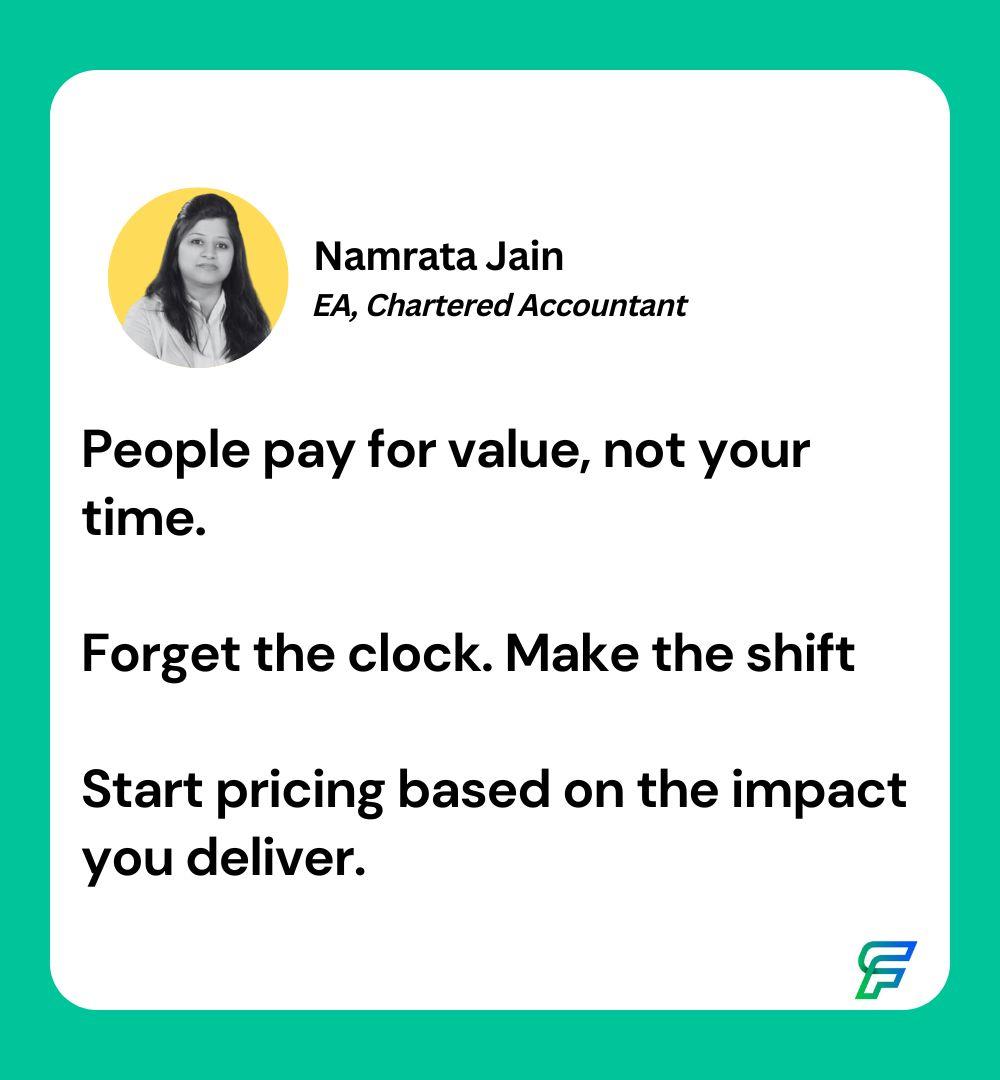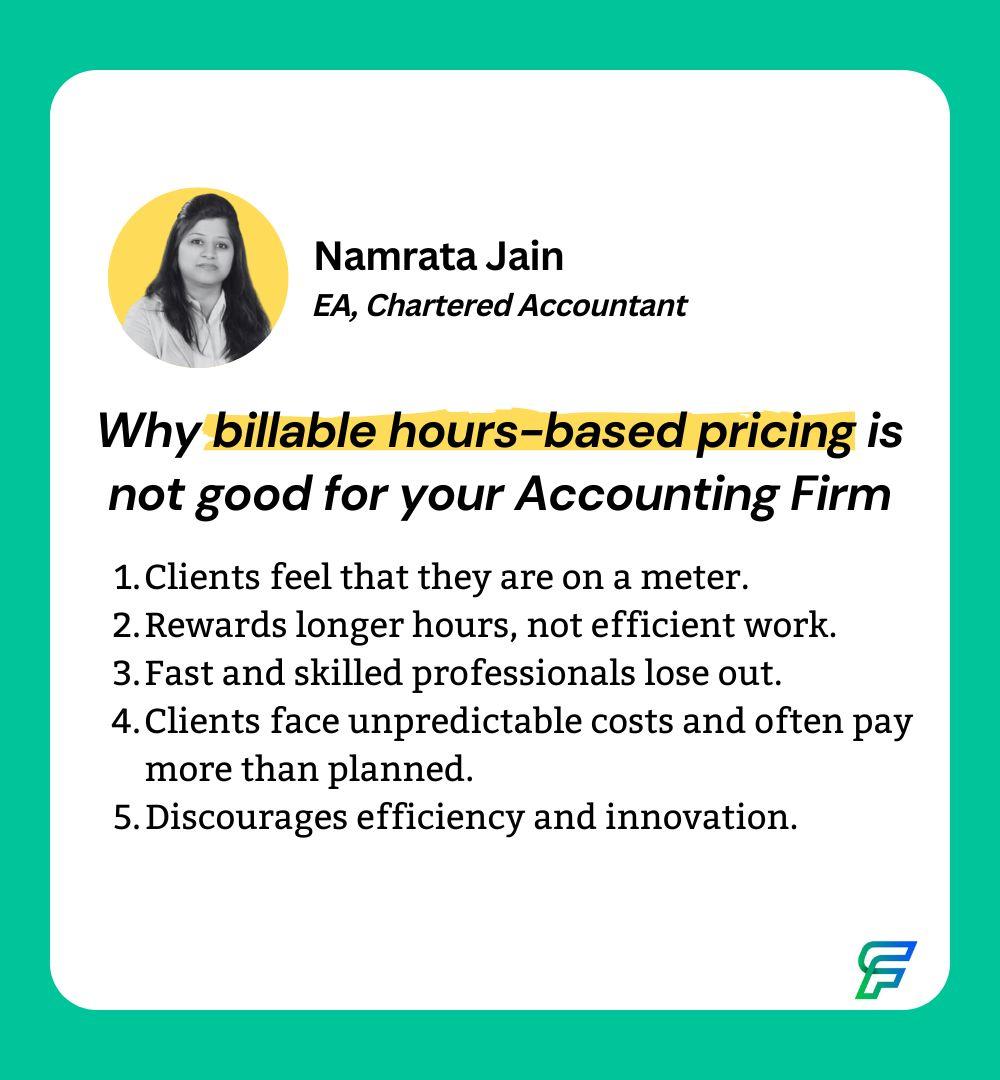
Top 9 Reasons to Hire an Indian Virtual Bookkeeper
The benefits of having virtual bookkeepers are not limited to saving overhead costs and scaling. Explore the same in this blog.

In cost-based pricing, you set your fees according to the overhead costs and other expenses you incur. With competition-based pricing, your charges align with what your competitors are charging. In value-based pricing, you determine your fees based on the value you provide to your customers.
Is that the right thing to do?
If yes, then how to compute the ideal price for your accounting services?
What factors should be considered in value-based pricing for accounting firm?
That’s what we are going to discuss here.
So before you settle with one pricing model, read this article.
Value-based pricing is a strategy that sets service fees based on the perceived value delivered to the client rather than the costs of providing those services.
In the accounting firm context, this means that fees are determined not just by the time spent on a project or a flat fee, but by the tangible outcomes achieved.

For example, when a tax firm offers tax planning and advisory services, the fees aren’t calculated based on the hours worked or the firm’s overhead costs.
Instead, they reflect the client’s unique needs and the amount of money saved through the firm’s expertise. This approach aligns the firm’s success with the value provided, creating a win-win for both parties.
Key benefits of value-based pricing include:
I have talked to many accounting firm owners still sticking with the hourly pricing model. If you are also doing the same, we really need to talk!
For years, accounting firms have traditionally relied on hourly rates as their primary pricing model.
This approach, while straightforward, often limits revenue potential and can lead to a perception of commodity pricing.

Hourly pricing is a common method where you charge clients based on the number of hours worked. This approach often leads to a few key challenges:
Shifting from hourly pricing to value-based pricing not only enhances your revenue potential but also fosters healthier client relationships and encourages a focus on delivering exceptional results.
“Only so many hours you can work! It’s a constraint, not value, not even a cost.” – Ron Baker
Ready to explore value-based pricing? Schedule a call and discover how it can benefit your firm!
There are many pricing strategies for accounting firms. But my favorite of all has to be the value-based pricing.
Cost-based pricing, flat fees pricing model, billable hours etc. – all these pricing models have many drawbacks stopping accounting firm owners from growing, making their firms scalable and delivering top-notch service to their clients.
In recent years, there’s been a growing trend towards value-based pricing, which positions firms as strategic partners rather than mere service providers. But still accounting firm owners hesitate.
Accounting firms Believe that effort equals outcomes
This misconception leads many firms to focus on the time and resources invested in a project rather than the tangible results achieved. As a result, they may undercharge for services that deliver significant value or overcharge for services that don’t produce the desired outcomes.
To avoid this mistake, it’s essential to shift your focus from the inputs (effort) to the outputs (outcomes). By understanding and communicating the value your services deliver, you can justify higher prices and build stronger client relationships.
Shifting from hourly rates to value-based pricing requires a strategic approach.
While value-based pricing can be the most profitable pricing strategy if implemented properly, other common strategies include:
Find out if value-based pricing is right for you Schedule a call with us today!
Example: Financial Advisory Firm
Traditional Pricing: An hourly rate of $250 per hour.
Value-Based Pricing: A fee based on the percentage of cost savings achieved.
For instance, the firm could charge 20% of the total cost savings realized by the client through their recommendations.
Scenario: A client approaches the firm seeking help with reducing their energy costs. After a thorough analysis, the firm recommends several energy-saving measures that could result in annual savings of $50,000.
Under Traditional Pricing: The firm would charge based on the time spent on the project, potentially totaling several thousand dollars.
Under Value-Based Pricing: The firm would charge 20% of the annual savings, resulting in a fee of $10,000.
This value-based approach aligns the firm’s interests with the client’s goals and provides a tangible measure of the value delivered. It also allows the firm to charge a premium for their expertise and results.
In conclusion, value-based pricing can be a powerful tool for accounting firms looking to differentiate themselves, increase revenue, and build stronger client relationships.
By shifting your focus from hourly rates to the value delivered, you can position your firm as a strategic partner and unlock new opportunities for growth.
Looking for a partner to navigate through the transition? Let’s talk!
Value-based pricing is a strategy where accounting firms set their fees based on the perceived value they provide to clients rather than just the costs of delivering those services. This approach focuses on the outcomes and benefits that clients receive, allowing firms to align their pricing with the actual value delivered.
You should consider value-based pricing when:

The benefits of having virtual bookkeepers are not limited to saving overhead costs and scaling. Explore the same in this blog.

A virtual bookkeeper is an experienced professionals who work remotely, offering a cost-effective solution for handling routine bookkeeping tasks.

Understand how you can implement an efficient tax practice workflow by hiring an offshore tax team this tax season.